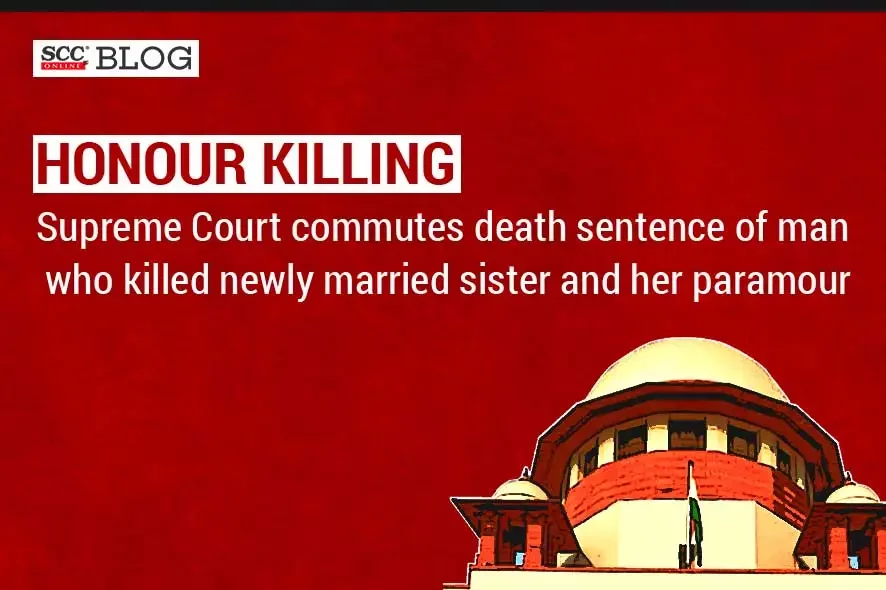Supreme Court: In a criminal appeal challenging the common judgment and order passed by High Court of Bombay, a Full Bench of Bhushan Ramkrishna Gavai*, Vikram Nath, Sanjay Karol, JJ. partly allowed the appeal of Digambar (accused 1) by maintaining his conviction under Section 302 of Penal Code, 1860 (IPC) and commuting his death sentence to life imprisonment considering the view that the High Court as well as the Trial Court erred in holding the present case to fall under ‘rarest of rare' cases to award capital punishment to the accused.
Factual Matrix :
The Trial Court took note of the conspectus of facts wherein, Pooja (deceased 1) left her matrimonial home without informing anyone and owing to this incident her husband lodged a missing report at police station. The next day the accused 1 along-with the accused 2 went to the house of Mohan’s (deceased 2) sister, where they found both. On their way back to village they stopped near a canal where the accused 1 tried to convince both the deceased to end their affair and when they didn’t listen to him he assaulted them with a sickle, as a result both of them died.
The Trial Court convicted accused 1 for the offences punishable under Sections 302, 201 and 120-B of IPC and awarded death penalty while the other accused 2 was sentenced to go under life imprisonment. Both the accused filed criminal appeals in the High Court which was subsequently confirmed. Hence, the accused filed the instant appeal against the impugned judgment and sentence.
The prosecution contended that the Trial Court as well as the High Court have rightly found that the appellants had committed the ghastly murder and awarded a capital sentence, it was submitted that the present case is nothing but a case of honour killing.
While the Court felt no interference was warranted with the concurrent findings of the trial court and the High Court the main issue for consideration before the Supreme Court was whether the case qualifies as ‘rarest of rare'.
The Court took note of its certain other precedents as to which cases fall under the category of ‘rarest of rare' case while adjudication.
In Mohinder Singh v. State of Punjab, (2013) 3 SCC 294 wherein, it was stated that awarding of life sentence is a rule and death is an exception, the Supreme Court observed that the application of the ‘rarest of rare ‘ cases principle is dependent upon and differs from case to case. However the principles laid down and reiterated in the various decisions of this Court show that in a deliberately planned crime, executed meticulously in a diabolic manner, touching the conscience of everyone, and thereby disturbing the moral fibre of the society would call for imposition of the capital punishment in order to ensure that it acts as a deterrent.
In an another case, Sundarrajan v. State by Inspector of Police (2023) SCC OnLine SC 310 this Court said that while considering whether the death sentence is to be awarded or not, the Court will have to consider the grave nature of crime and whether there was a possibility of reformation of the accused.
The Court noted that both the accused did not have any criminal antecedents and the medical evidence of the deceased further revealed that single injury was inflicted on the deceased suggesting the act was not brutal. The age of the accused 1, which was 25 years at the time of conviction was also one of the factors the Court took note of while considering the commutation.
Thus, the Supreme Court held, it was convinced on the basis of the evidence adduced that the prosecution confirmed the commission of offence by the accused, however, the High Court and the trial court have erred in holding the present case as ‘rarest of rare' therefore, appeal partly allowed, by maintaining conviction of accused 1 under Section 302 of IPC, the Court commuted the sentence of capital punishment to life imprisonment the Court further dismissed the appeal of accused 2 and passed an order to dispose of any pending applications.
[Digambar v. State of Maharashtra, 2023 SCC OnLine SC 531, decided on 28-04-2023 ]
Judgment Pronounced By: Bhushan Ramkrishna Gavai, J.
For the Appellant: Advocate Sudhanshu S. Choudhari and Advocate Subodh S. Patil
For the Respondent: Advocate Chinmoy Khaladkar






